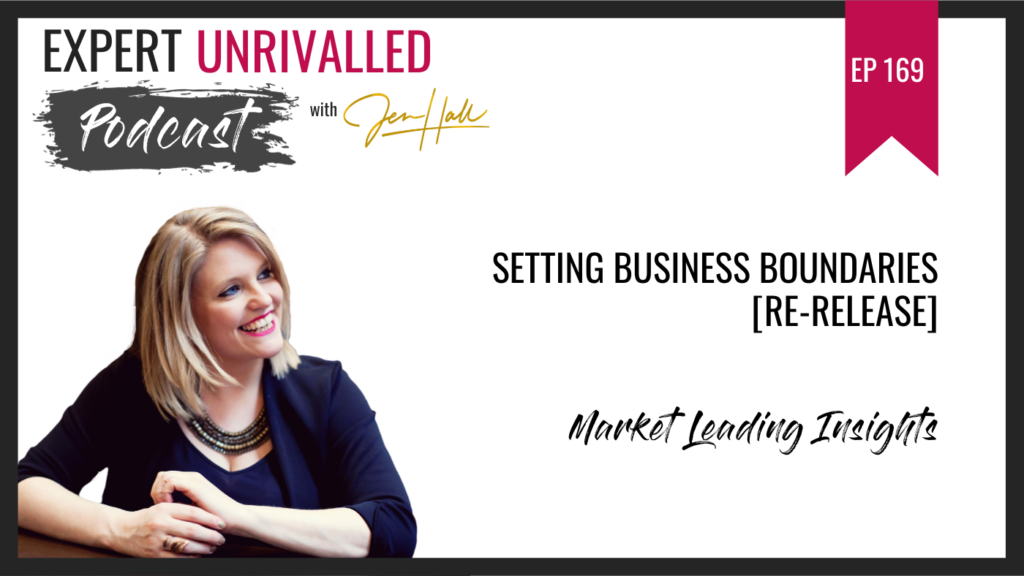If you’re fed up with being a doormat for your clients, then get some business boundaries in this episode.
If you want to:
- Stop feeling like a doormat
- Put some boundaries in place
- And start feeling like a business bad-ass
Then listen to this podcast episode on the player above or read the blog below where I’m sharing three tips on how you can set better boundaries in your business this year (and the boundaries you really need to have in place to be a market leading business).
How To Stop Being A Doormat And Create Strong Business Boundaries
I would love for you to feel like you’re taking charge of the sales and client process this year. While you’re a partner in your conversations with clients and prospects, you first need to honour your boundaries. Of course, we need to make sure things are fair on both sides. There is nothing worse than ego where “it is my way or the highway”, so we don’t need to lean into this kind of negative energy but I do believe that you need to set boundaries that are right for you in your business.
You may know that I specialise in building market leading businesses, helping you articulate what you do and craft a USP that stands out above the rest. One of the biggest surprise cherries on the cake is that I can help my clients take charge of the client management process. Then you feel in control, you feel good and confident. You don’t feel like you’re muddling your way through the process.
Your clients have a right to respond, but the key is in how you then respond in return. Here is where there are nuances to setting and keeping those boundaries. It’s one of the biggest takeaways for my clients that I can help them navigate these situations. So I want to share some tips on how you can take control, stop being a doormat and honour yourself in business.
If you want this kind of support and to build a market leading business, get in touch. Either email me jen@jenhall.com or book a no pressure Clarity Call.
Boundaries, Boundaries, Boundaries
Boundaries are essential both in business and in life. My clients have realised that once you get this sorted in business, you can then set them in life as well.
1. Understand Why You Need To Say No
The only way you’ll know when to say no is when you know what your non-negotiables are. While you figure this out, do not be afraid to walk away from a conversation and come back to it. If you’re unsure about something, you can go back to them. The more prepared you are the better, especially in a sales call because getting someone back on board can be quite difficult if you need to go away and come back.
But if something pops up and you’re not sure what to do then come back to it because saying yes to something you don’t want to do is worse than losing a potential client. When you move the goalposts like this, it leaves a sour taste in your mouth and theirs.
If you look at what worked and didn’t work last year will be important to understand your non-negotiables. What are you unwilling to put with during 2024 that you have done in the past year? For example, one of my clients said she no longer wants to travel or do face-to-face workshops in corporates any more. And she’s done a good job of saying no to someone. Plus, it’s easier to deliver online so becomes a preferred choice for some people.
When you understand what you want to stop doing, you can start putting boundaries in place. You may want to stop offering discounts or stop people taking advantage of your time. What didn’t you enjoy in 2023? If you take that out and put boundaries in place, would it make your year much better?
You can have a couple of exceptions but you need to feel good about it. Consider how those boundaries make you feel and how those exceptions make you feel.
Contracts And Terms & Conditions
In EverTrek, we have a shared value about doing the right thing. Doing the right thing counts for your business as much as it does for your customers. You need to have a balance. This is why you need T&Cs and contracts, that they are read and visible so customers understand what they are getting into. You may want to go above and beyond in exceptional circumstances but you need to feel comfortable about enforcing them.
When it comes to finance, you need to lay it out in black and white about what happens. You can make judgements about exceptional circumstances but make sure you have those contracts in place.
If you do this, you will move into 2024 on a more consistent line. Having a coach or mentor can help so when you’re having a wobble, you can have a chat to reframe the non-negotiables. Find someone to help you when you have those wobbles.
2. Pricing
I see people dishonour themselves on price all the time. When you move on pricing you risk regretting it afterwards. If you offer discounts, it is so unfair on other clients and customers. It is not a fair way of doing business. We can forget that pricing is about other people and make it all about ourselves. Rarely do we ask if it’s fair on the customer who is paying more.
There are exceptions to this for example, if it is a source of continual work and that is part of the offer then you have an opportunity to give certain deals. When you are looking at a consumer, yes they can refer you to friends but they are not people in charge of hundreds of employees. It is not the same playing field.
So for consumers, instead of offering a discount, give them something that fits their budget if it still delivers a result. As long as you are transparent about the outcome, you haven’t moved on your boundaries but are negotiating the product you offer that particular client. If you show they the result they get from each product, they tend to go for the higher priced product as they get a better result.
In corporate sales you may need to offer a one-off and then it leads to further work. At the further work stage, you can negotiate different rates. You can have the two rates in your mind depending on what they offer for the future.
3. People Taking Advantage Of Your Time
People taking advantage of your time can be as much of a problem as money. This happens when you are not clear about your time and energy, plus what you are willing to give. In my client contracts, I set out the boundaries and expectations. In there it tells you that I will not be available from Friday to Sunday and that I’m unavailable on certain holidays.
I will tell clients that if I am going away they need to send me anything that they need me to review in advance. Again, it’s managing the process. All of this is in my contract so people know not to message me within a certain time frame. Then your clients don’t feel let down on service level as you’ve set out those agreements up front.
If part of the programme is to enter a Facebook Group, then there are boundaries and expectations for their behaviours inside that group. This isn’t about being controlling but about creating a nice environment that’s respectful of time. It also helps people be more organised. They can step up to manage and own their business to start working like a CEO.
Again, when you don’t respond you aren’t worrying about getting in touch outside of working hours. Label it out and stick to it then you can’t worry about people getting annoyed. Knowing your non-negotiables on time and energy is important.
For example, I have a 48 hour turnaround on up to four sheets of documents. If it goes beyond this then it may need to go into the next section. There have to be boundaries on the amount you’re willing to do as well. Have a good think about what you’re willing to do.
Useful Links:
Book a Call with Jen – bit.ly/claritycallpodcast
Download my FREE Seven Figure Market Leader Roadmap –http://www.marketleaderleague.com/marketleaderroadmap/
Send your emails to jen@jen-hall.com
Available on Apple iTunes, Spotify & Stitcher (Just search Expert Unrivalled Podcast)

